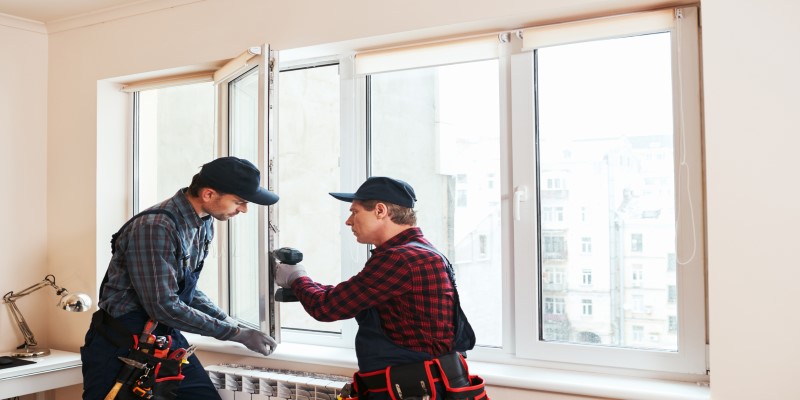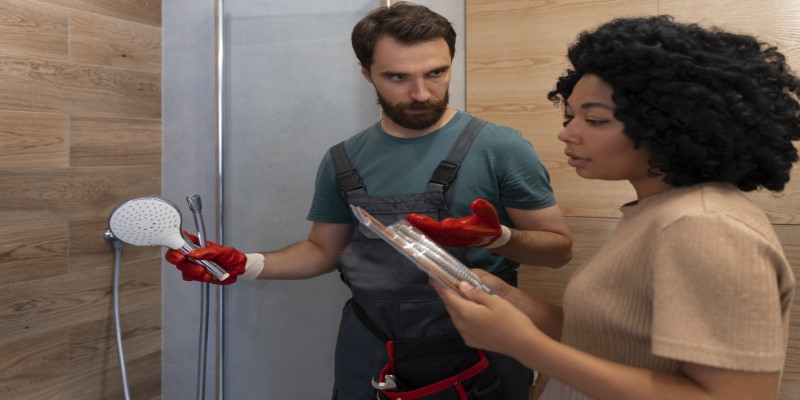10 Common Repairs You Need to Handle in Your Rental
Dec 23, 2023 By Triston Martin
We all know that when you're renting a place, it's your landlord's job to keep the place in good shape. They're responsible for fixing most things that go wrong, right? Well, not exactly. While landlords are usually responsible for maintenance and repairs, certain things fall under the tenant's domain.
It's important to know what these responsibilities are to ensure you're not caught off guard and that you're taking proper care of your rented home.
Exploring 10 Repairs That Aren't Your Landlord's Responsibility
Here are ten repairs that aren't your landlord's responsibility:
Light Fixture Repairs
While landlords are responsible for providing functional light fixtures in your rental unit if a light fixture becomes faulty or breaks due to your actions, it's typically your responsibility to repair or replace it. For instance, if you accidentally break a light bulb socket or damage the wiring while changing a bulb, you should cover the cost of repairs or replacement.
To prevent such issues, handle light fixtures with care during bulb replacements, and be cautious not to overtighten or force bulbs into sockets.
Broken Windows
Accidents happen, and sometimes windows can get broken, whether it's from a stray baseball, a falling branch, or other unforeseen incidents. In most cases, repairing or replacing a broken window is the tenant's responsibility unless the damage resulted from a structural issue or the landlord's neglect.

To address this repair, contact your landlord immediately to inform them of the situation. They may have preferred vendors for window repairs or replacement.
Interior Painting
If you want to change the color of your walls or refresh the paint in your rental unit, it's generally something you'll need to take care of yourself. Landlords have a duty to uphold the structural soundness and operational functionality of the property, although they may not be required to redecorate the interior solely for cosmetic purposes.
Before undertaking any painting projects, consult your lease agreement and discuss your plans with your landlord. Certain landlords might permit you to paint, provided you commit to restoring the walls to their original color before vacating the premises. In contrast, others may opt for you to maintain the current wall colors to prevent possible complications.
Toilet Clogs Caused by Tenant Actions
Toilet clogs can be a common household issue, and whether it's due to excessive toilet paper use or flushing items that shouldn't go down the drain, clogs caused by tenant actions are typically the tenant's responsibility to resolve. Regular maintenance, like using a plunger or a drain snake, should be part of your tenant toolkit.
However, if you believe the clog is due to a plumbing issue within the walls or pipes, it's essential to inform your landlord promptly, as this may fall under their responsibility.
Flooring Damage Resulting from Tenant Actions
Flooring can take a beating over time, especially in high-traffic areas. If your actions result in damage to the flooring, such as scratches, stains, or dents, it's generally your responsibility to repair or cover the cost of repairs.
To prevent flooring damage, use furniture pads to protect hardwood or laminate floors, clean up spills promptly, and follow any care instructions provided by your landlord.
Cabinet and Drawer Repairs
Suppose a cabinet door or drawer in your rental unit becomes loose, detached, or damaged due to regular wear and tear or tenant actions (such as forcing them open or closed). In that case, it's generally the tenant's responsibility to repair or replace them. Simple repairs, like tightening screws or reattaching hinges, can often resolve these issues.
To maintain your cabinets and drawers, handle them gently, avoid overloading them, and report any significant issues to your landlord to ensure proper maintenance.
Showerhead Replacements
Showerheads can wear out or become clogged over time, affecting water pressure and shower experience. While landlords are responsible for providing a functional shower, it's typically the tenant's responsibility to maintain and replace the showerhead when needed.

Replacing a showerhead is a relatively simple DIY task. You can find various showerhead options at most home improvement stores. Just be sure to keep the old showerhead to reinstall when you move out, as landlords often require the original fixtures to remain in place.
Minor Wall Repairs
Small holes or dings in the walls are common in rental units and can result from hanging pictures, shelves, or other decorations. While significant wall damage should be reported to your landlord, minor repairs, such as filling in small holes with spackling and touching up the paint, are typically the tenant's responsibility.
Before making any repairs, consult your lease agreement to ensure you're following any specific guidelines or restrictions regarding wall alterations. Keep a small supply of paint and spackling on hand to address these minor issues promptly.
Lawn and Yard Maintenance
If your rental property includes a yard or outdoor space, maintaining it is often the tenant's responsibility. This includes tasks like mowing the lawn, weeding, and general upkeep. Landlords are usually responsible for more extensive landscaping or structural issues, but day-to-day maintenance falls to the tenant.
In order to maintain the optimal appearance of your outdoor area, it is essential to create a consistent maintenance schedule and follow any instructions given by your landlord. If you're unsure about your responsibilities, discuss them with your landlord to ensure you're on the same page.
Replacing Door Locks
Suppose you ever find yourself in a situation where you feel your safety is compromised, such as losing your keys or needing to change the locks for security reasons. In that case, it's generally your responsibility to replace door locks in your rental unit.
Before changing the locks, inform your landlord and obtain their approval if required by your lease agreement. Many landlords have specific policies or requirements for changing locks, so it's essential to communicate openly to avoid any misunderstandings.
Conclusion
In conclusion, as tenants, understanding our responsibilities regarding repairs and maintenance is essential for a harmonious rental experience. While landlords are accountable for many aspects of the property, there are certain repairs, from cabinet fixes to showerhead replacements, that fall under our domain.
Clear communication with landlords and adhering to lease agreements are key to ensuring a well-maintained rental space. By taking these responsibilities seriously, we contribute to a positive living environment for ourselves and our landlords.

Managing my money for young adults | OpenLearn
Learning to handle your money well early in life to set a pattern for years of financial security
Nov 05, 2024 Elva Flynn

When to Take Social Security
At 62, you are eligible to begin receiving Social Security payments, but your benefits will be cut indefinitely after that point. The more significant the monthly gift, the longer you can wait after age 62 (up to 70).
Jan 20, 2024 Susan Kelly

What is Publication 3 of the Armed Forces Tax Guide?
Members of the armed forces should be aware of the numerous resources for free tax preparation accessible to them. The initiatives range from free access to tax preparation to working with volunteer tax preparers. Retirees can take advantage of the programs on several bases. One of the most delicate things you can do is start tax preparation, even if you don't have to file a return until next year.
Oct 06, 2023 Triston Martin

Smart Swiping: A Roadmap to Maximizing Credit Card Rewards Redemption
Are you ready to make the most of your credit card rewards? Learn the art of redemption and unlock exclusive perks with our step-by-step guide.
Jan 28, 2024 Susan Kelly

Ways to Improve Your Chances of Finding Work after College
Myth: college degree = employment. Fifty-three percent of university graduates are jobless or working in non-degree jobs. College graduates require four to six months to find work. A career-seeking approach and job experience help students. Her résumé might be buried in a pile of hundreds seeking a job. Career planning must be continuous for students. They can change paths and don't have to choose immediately away. Students need to prepare for a lifetime.
Nov 25, 2023 Susan Kelly

10 Common Repairs You Need to Handle in Your Rental
Discover the repairs tenants should handle themselves. Learn when it's your duty, not your landlord's, to fix common issues in your rented space.
Dec 23, 2023 Triston Martin